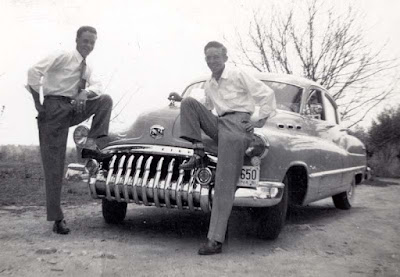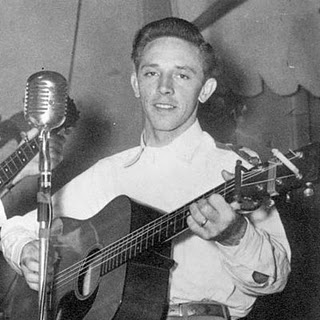Pete Pike (30 November 1929 - 27 August 2006) had a long & interesting career in both country & Bluegrass music, recording for such early post-war labels as 4-Star, Coral and Rebel. With the likes of Roy Clark, Don Stover, Buzz Busby and Scotty Stoneman, he helped introduce and popularize Bluegrass music in the Washington, D.C. area as early as 1949.
Pete Pike was born on a tenant farm November 30th, 1929, in Amelia, Va. When he was about twelve years old his Dad gave him and his brother, Frank their own little half-acre of tobacco and from the profits earned from the sales from grain and tobacco on the seventy-acre family farm. Frank purchased a Gibson J 200 guitar for himself and a Gibson F5 mandolin for Frank. Pete learned to play guitar on a Sears and Roebuck guitar and an Ernest Tubb songbook. His main ambition was to sing. His inspirations were groups such as the Carter Family, The Delmore Brothers, Roy Acuff, and Bill Monroe.
 |
| Franklin & Pete Pike |
The Pike boys formed a local band in the ‘40s, about the time Pete met his life-long friend and banjo partner, Buck Austin. They began playing in the local Amelia Theater and soon Pete and Frank’s dad let them play with him and his brother Cephas Pike, the Virginia State Champion Fiddle Player at the time. It wasn’t long before the boys were playing for “a lot of dances” in and around the eastern Virginia area.
In 1947, Pete and the band left Amelia and the pace of their lives began to pick up. They played a weekly radio show on WKLV in Blackstone, Va. It was so successful the station manager brought in a big star, Little Jimmy Dickens, and started an annual outdoor event – The Virginia Folk Music Association. Pete and Buck decided to go to Washington to play with Roy Clark at the Camden Tavern. These were the years of hard training, four hours a night, six days a week.
 |
| Buzz Busby, Pete, Donnie Bryant, Lee Cole |
In the summer of 1949, Pete worked at Jo-Del’s Bar and Grill for what was to be the last time with Roy, as well as with a bass player named Curley Irvin. Pete now decided to move into doing shows. Figuring they had “nothing to lose”, he called Bill Monroe one night after his last act on the Grand Ole Opry stage in Nashville. Monroe couldn’t use them, but suggested they contact WWVA in Wheeling, W.Va. They headed there, went on the air, sang a duet, and did the show until 1952.
Pete then went in the army, got married in 1952, and was honourably discharged from the service in 1954. When he arrived back in Washington, D.C. he met mandolin player Buzz Busby from Eros, La Over the next ten years and again in 1976 and 1985, the two would record countless records, producing some of the classics of the early bluegrass era.
 |
| Pete in concert 1952 |
Pete had two hit records, “I Can See An Angel Walking” and “Little Bitty Teardrops” which earned Billboard’s Five Star Pick Hit designation. WRC-TV Channel 4 in Washington approached Pete for a hillbilly, five-day-a-week show. The station’s program director had noticed the huge crowds showing up for hillbilly and Grand Ole Opry stars events in the area. He’d also been tipped off that Pete and Buzz had won four prizes at the National Championship Country Music Event in Warrenton, Va., that summer.
Throughout the 1950s Pete and Busby continued to play among the more than fifty clubs in the Washington, D.C. area. In the summer of 1958, the band rented Watermelon Park in Berryville, Va., and booked groups like the Stanley Brothers and George Jones. Before signing with Rebel Records in late 1959, Pete, Busby, and various other artists together recorded a string of songs, primarily at the Adelman Studios, for Four Star and Starday. He then stayed with Rebel until 1963.
Like many artists, Pike tried his hand at running his own record company, VRC (Virginia Recording Company) in 1967/68. Later on, he had records on MRC, Stop and Music City. From 1978 to 1996 he went in the timber business then a diner restaurant n Amelia.
Later he was diagnosed with brain cancer. After successful surgery, it had seemed that he had won the battle, but died from further complications on 27 May 2006. He had been working on a come-back CD “Rolling Again”, which was a mix-up of new and older 50s songs.
(Edited mainly from bopping.org & nrv.host.com)





